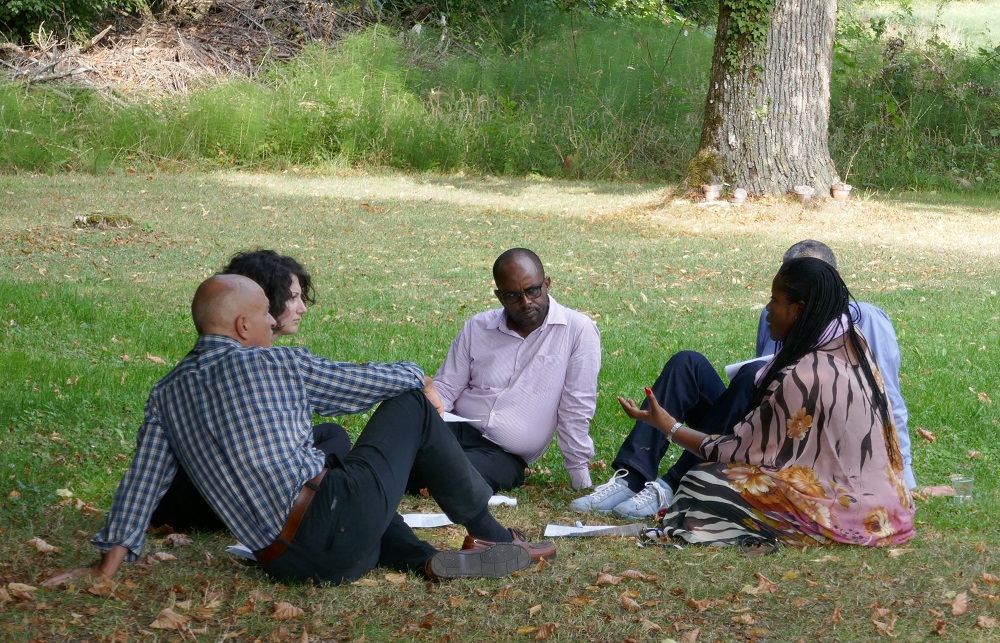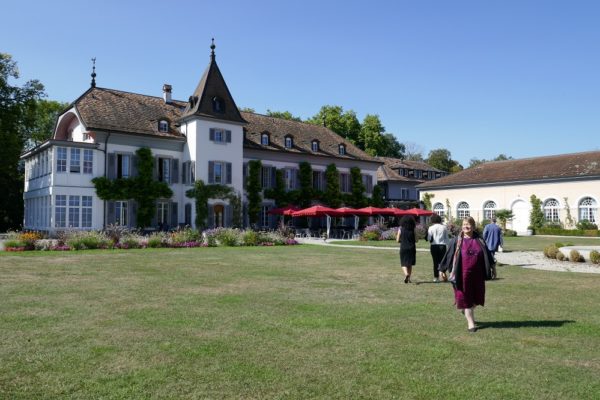Effective Advising Course 2018: Taking Advisers on a Reflective Journey

For the fifth time Interpeace’s International Peacebuilding Advisory Team (IPAT) gathered twenty experts from around the world who currently advise governments, international organizations, or civil society entities in fragile or conflict-affected countries. During an eight-day course on “Effective Advising in Peacebuilding Contexts” at Chateau de Bossey, Switzerland, IPAT took them on a reflective journey to enhance their advising practice, based on concrete experiences and challenges.

Chateau de Bossey, Switzerland. Photo credit: IPAT
Objective and learning approach
Developed in 2013 following a request by the Human Security Division of the Swiss Federal Department of Foreign Affairs (FDFA), the Course aims to better equip the Swiss Expert Pool and international advisors working in contexts where governance challenges often interfere with the effective delivery of technical assistance. As such, the Effective Advising Course provides guidance and tools to help participants analyse their own advisory roles, better understand their contexts of operation, and apply key frameworks for capacity development, change and inclusive governance to their own cases. The course facilitates learning not only through the inputs provided by the IPAT team, but also by creating space for peer-to-peer exchanges and self-reflection. Going beyond a classical training focussed on transferring skills, the course therefore enables participants to identify how they can strengthen the alignment between their own purpose, values, and role. This will help them navigate the challenging situations they face when advising others in complex conditions and enhance the effectiveness of their advising practice.

Chateau de Bossey, Switzerland. Photo credit: IPAT
Insights from two experienced female advisors
In 2018, the course included a session with Mô Bleeker, Special Envoy for Dealing with the Past and Prevention of Atrocities at the Swiss FDFA. Together with participants, Mô explored and discussed responses to concrete, real-life dilemmas encountered during her extensive international experience. Interpeace’s Deputy Director-General, Renée Larivière, joined the participants for a discussion of key challenges related to peacebuilding and gender today, drawing on her 18-year experience as a female peacebuilder and advisor.

Chateau de Bossey, Switzerland. Photo credit: IPAT
Participants’ experience
Participants confirmed the value of the course with an average rating of 4.78/5 to the course, with 75% assigning it a rating of 5/5. Participants highlighted for example:
“I enjoyed the interactive nature of the learning experience. The presentation of personal cases helped me reflect and strategize on how to be a better advisor.”
“I have been able to acquire knowledge and tools on how to manage myself even while carrying out my advisory work.”
A follow-up evaluation, sent to the participants of the 2017 edition six months after the Course, revealed that a majority of respondents applied the acquired knowledge, insights and tools to their work, and 80% shared the materials with colleagues and partners. Some indicated, for instance:
“The course helped me put in perspective the various advisory roles I plan during the course of the day of interacting with my national counterparts. I also continue to nurture my understanding of self, in terms of managing relations with co-workers and national counterparts.”
“I have shared the course materials with colleagues in my office as well as some government counterparts. In various meetings, I have tried to institute some of the skills I learnt on negotiations and role playing into discussions and this seems to be working well.”

Chateau de Bossey, Switzerland. Photo credit: IPAT
First regional edition of the Course in Kenya
Building on this proven success, a regional edition of the Effective Advising Course is being delivered for first time in 2018 this week in Naivasha, Kenya. Specifically focused on African settings, this 5-day version will give selected participants a unique opportunity to learn from each other through contextualized discussions and cases studies.
For more information on the two editions of the course, including application dates, forms and brochures, see the “Course” section of IPAT’s website or send your request to effectiveadvising@interpeace.org.
This course has been run by Interpeace since 2013, on behalf of the Human Security Division of the Swiss Federal Department of Foreign Affairs.

